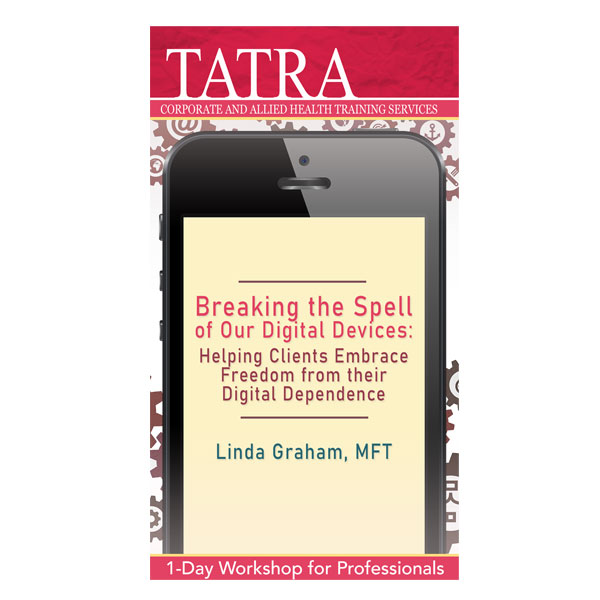Breaking the Spell of Our Digital Devices: Helping Clients Embrace Freedom from their Digital Dependence
Breaking the Spell of Our Digital Devices: Helping Clients Embrace Freedom from their Digital Dependence

Linda Graham, MFT
The rapid advances in digital technology in the last ten years have radically transformed how we learn, work, and relate to each other. Many of those cultural shifts are life enhancing, even life-saving, to be sure. The impact of digital dependency – reduced capacities of attention, concentration, empathy, and self-reflection – has become a pressing mental health concern that therapists are noticing and beginning to address in session.
COVID-19 UPDATE
TATRA Training Services regrets to announce that Linda Graham will be unable to travel to Australia to present this workshop, due to travel restrictions and the unfolding situation with COVID-19.
Linda Graham is disappointed that she is unable to make it to Australia on this occasion, but she will be delivering the same workshop content in a digital format. Coronavirus and the logistics of event management have presented challenges for TATRA but we are doing our utmost to ensure that high quality professional development sessions continue to be delivered to you in a safe and comfortable environment.
The rapid advances in digital technology in the last ten years have radically transformed how we learn, work, and relate to each other. Many of those cultural shifts are life enhancing, even life-saving, to be sure. The impact of digital dependency – reduced capacities of attention, concentration, empathy, and self-reflection – has become a pressing mental health concern that therapists are noticing and beginning to address in session.
In this training, you will:
- Learn of the emerging research on the impact of the over-use of digital devices on brain development and functioning, particularly for children and adolescents;
- Learn to assess for and have “the conversations” about digital dependence/addiction in clients and clients’ families;
- Learn protocols of digital detoxes and digital vacations to reduce clients’ brain fog, mood swings, anxiety, depression, loneliness, and isolation;
- Learn tools to reverse the negative impacts of digital technology on users’ capacities for working through difficult emotions, feeling comfortable with vulnerability and intimacy, tolerating boredom and solitude;
- Learn to teach clients practices that help them rediscover the value of time spent in communicating and connecting with real people in real time, spending time in nature, playing games and sports, conversing at the family dinner table.
You will be able to guide clients toward a healthy balance between time spent on screens and time spent in “real life.”
Learning Objectives
At the end of the training, participants will be better able to:
- Describe the role of dopamine in catalyzing and maintain addictive behaviours.
- Describe five impacts of overuse of digital technology on brain functioning and relationships.
- Initiate a therapeutic inquiry with clients about usage and impact of digital devices on their relationships and functioning in the world
- Help clients develop realistic plans for monitoring and managing their use of digital devices
- Help clients develop realistic goals to reduce screen time.
- Teach clients 3 mindfulness practices to improve attention, concentration, and mental processing
- Help clients develop realistic goals for re-introducing activities and interactions that bring meaning and reward
Program Outline
Benefits of Digital Revolution
- Access to news, information, entertainment, instant and almost infinite
- Organization and storage of research, records and information, instant and almost eternal
- Communicating with others easily regardless of distance, time differences, language differences
- Extension of online teaching and learning
- Ease of online marketing, purchasing, distribution, and financial services
Adverse Impacts of Digital Dependence
- Reduced capacities of attention, concentration, spatial processing, memory;
- Concerns that deficits in cognitive functioning might become permanent
- Impaired empathy
- growing superficiality in relationships
- less tolerance of distress and “messy” emotions
- discomfort with closeness and vulnerability
- feeling ghosted, neglected, unimportant
- risks of cyber-bullying and suicidality
- Diminished self-reflection and appreciation of solitude
- Avoidance and feeling “stuck,” missed opportunities to strengthen resilience
- More convenience, fewer choices, less willpower, less privacy
- Less time spent in “real life” activities and meaningful conversations
- Risk of digital addiction and ADD
Assessment of Distraction, Dysfunction, Addiction in Clients
- Neuroscience of dopaminergic pathways underlying all addictions
- Disclosures from researchers and professionals of intentional programming of devices, apps, and social media to be addicting, driven by new “attention economy”
- Targeting of children and adolescents as “addictable” consumers
- Correlation of increased screen time with increasing symptoms of depression, anxiety, dissociation, isolation, loneliness and increasing diagnoses of ADD and bi-polar disorder
- Evaluating one’s personal relationship to digital technology, perceptual filters
- Therapeutic inquiry and psycho-education about normal v. addictive use of devices, differentiating behavioural change from brain change
- Teaching clients to monitor and assess their own use of devices, usage within their families
Strategies to Reduce Dependence on Digital Devices
- Creative v. confrontive conversations about digital use; explore options and choices
- Parental/partner role modeling of balanced time on devices
- Values-based tech plans – agreements and contracts about digital use – when, where, who decides, who enforces
- Strategies to strengthen social etiquette around use of devices
- Strategies for unplugging – identifying priorities, disciplined routines, digital vacations
- Established protocols of digital detox programs
- Advocating for shifts in cultural norms, particularly in schools and workplaces
Strategies for Recovering the “Normal” Life Activities and Interactions that Sustain Healthy Brain Functioning
- Teaching skills of emotional, relational and reflective intelligence to strengthen the functioning of the pre-frontal cortex
- Practicing communication skills to optimize conversations and decision making
- Strategies to recover and protect healthy sleep
- Participating in activities that re-direct the dopaminergic pathways of the brain
- Playing games and sports
- Pursuing artistic, creative endeavors
- Spending time in nature
- Rediscovering community volunteer work
- APS: Activities do not need to be endorsed by APS. Members can accrue 7 CPD hours by participating in this activity
- AASW: Members can accrue 7 CPD hours by participating in this activity
- ACA: Members can accrue 5 CPD points by participating in this activity
A certificate of attendance will be emailed to participants following the workshop.


